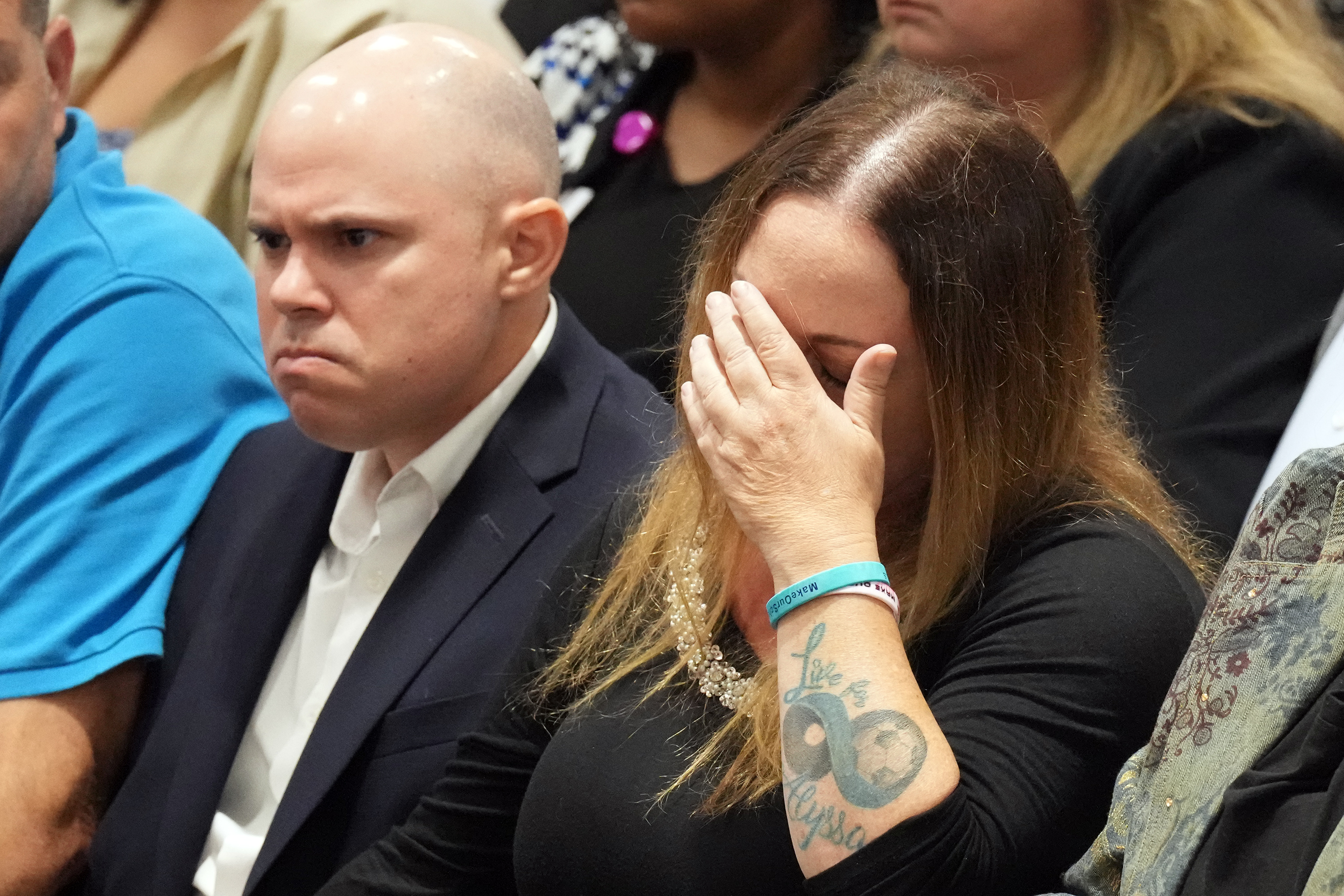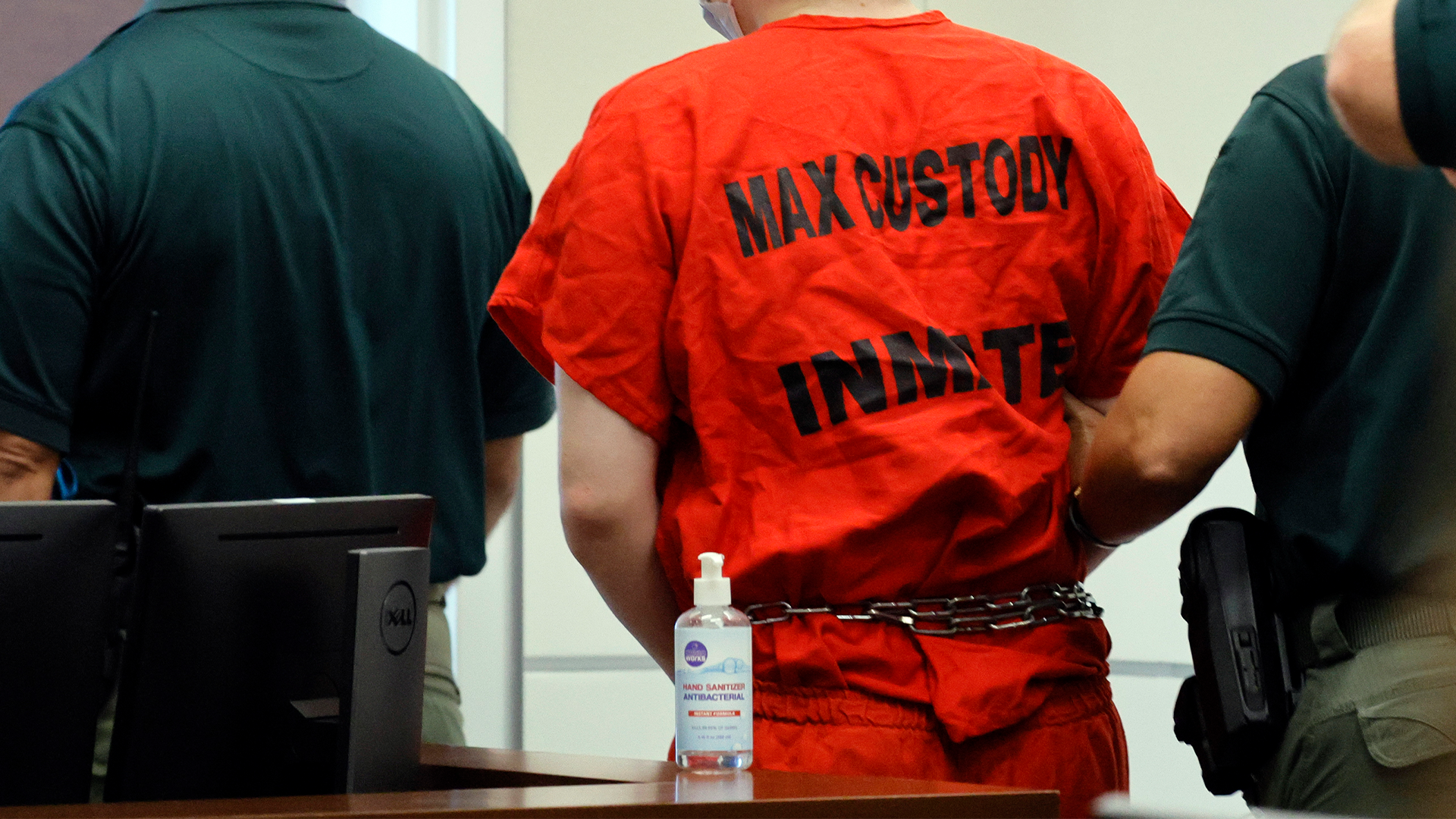Parkland school shooter Nikolas Cruz's two-day sentencing hearing began Tuesday with the families of the 17 people he murdered in Parkland getting their chance after almost five years to address him directly about the devastation he brought to their lives.
Family members cursed him to hell, wished him a painful death and called him a coward as they got their one chance to address him directly before he is sentenced to life in prison.
Watch NBC6 free wherever you are
>For hours, parents, wives, siblings, children and some of the 17 Cruz also wounded at Marjory Stoneman Douglas High School on Valentine's Day 2018 stood 20 feet from him. They looked the shackled killer in the eye and gave vehement, angry and sometimes tearful statements. Most decried that his jury did not reach the unanimity required to sentence him to death.
Cruz, 24, stared back at them, dressed in a bright red jail jumpsuit, showing no emotion behind a COVID-19 face mask.
Get local news you need to know to start your day with NBC 6's News Headlines newsletter.
>PARKLAND TRIAL
Some of the families had verbally attacked Cruz's public defenders, accusing them of misleading three of the 12 jurors into believing his birth mother's excessive drinking had left him brain damaged and unable to control himself. Some hoped that their consciences would always haunt them forever and would experience the pain they have felt, with at least one parent mentioning the attorneys' children.
“The legal system should protect and impart justice, justice, justice,” Patricia Oliver said, leaning over the lectern toward the defense attorneys and accusing them of “shameful, despicable behavior.” Cruz wounded her 17-year-old son Joaquin in the leg and then tracked him into a bathroom alcove. There, Cruz fatally shot her son in the head as he raised his hand to protect himself.
“If this, the worst mass shooting to go to trial, does not deserve the death penalty, what does?" she said.
The already tense proceedings got even more tense after the lunch break, when Circuit Judge Elizabeth Scherer once again clashed with defense attorneys who brought up the personal attacks against them.
Lead defense attorney Melisa McNeill eventually asked Judge Scherer to stop the families from attacking her and her colleagues directly, saying they had worked within the parameters of Cruz’s constitutional rights in defending him.
“I did my job, and every member of this team did our job, and we should not personally be attacked for that, nor should our children,” McNeill said, drawing a murmur from where the families sat.
Prosecutor Carolyn McCann told Scherer that the victims have the right under state law and the Constitution to “express themselves and be heard.”
When McNeill tried to respond to McCann, telling the judge she knew the parents were violating court decorum, Scherer stopped her.
“Stop suggesting that I know that something is improper," Scherer said, saying she had heard enough. She took no action against the families.
The argument continued after everyone returned from a lunch break.
"Like I said, 99% of what's been testified to has been appropriate, I do not want to highlight the few things that were said that were perhaps not appropriate," Scherer said.
Scherer, who earlier in the trial had clashed with McNeill, continued to direct her anger at the defense table.
"When these people are upset about specific things that have gone on from that table, like shooting the middle finger up at this court, and laughing and joking, Mrs. McNeil, be quiet!" Scherer yelled. "When these people have sat in this courtroom and watched this behavior from that table and they want to say that they're not happy about it, what is the problem?"
Chief Assistant Public Defender David Wheeler said family members had mentioned his children during their comments, and Scherer said she hadn't heard those comments.
"Judge, I can assure you that if they were talking about your children, you would definitely notice it," Wheeler said.
"You need to sit down, right now, you're out of line. In fact, you're excused, you need to go sit in the back with your chief public defender," an angry Scherer responded, as Broward public defender Gordon Weekes approached to address the judge.
"Mr. Weekes, please ask the lawyer from your office to go sit down and not say anything else. To try to threaten my children and bring up my children is inappropriate, go to the back of the room now. That just violated about every rule of professional responsibility that I have ever, I have never," Scherer said.
Weekes sought a sidebar or recess, which Scherer denied as she repeatedly told him to sit down.
"You're inappropriate and out of line, go sit down," Scherer said.
The first family member to address Cruz was Debra Hixon — the wife of athletic director Chris Hixon, a Navy veteran who died trying to stop the Feb. 14, 2018, shooting at Marjory Stoneman Douglas High School.
“You stole him from us, and you did not receive the justice that you deserved," Debra Hixon said. “There is no mitigating circumstance that will outweigh the heinous and cruel way you stole him from us.”
Chris Hixon was wounded and fell to the floor, where Cruz shot him again. He spent more than 10 minutes trying to get back on his feet before he died.
“You were given a gift, a gift of grace and mercy — something you did not show to any of your victims,” Debra Hixon told Cruz. “I wish nothing for you today. After today, I don’t care what happens to you. You’ll be sent to jail, you’ll begin your punishment, you’ll be a number, and for me you will cease to exist.”
"My brother Chris, on February 14, died a hero, not just to our family, to countless others of individuals that he touched. You, however, you will die as nothing, because you are nothing," sister Natalie Hixon said.
"It could be a week from now, it could be a month from now, could be 40 years from now, you're going to die," said David Robinovitz, the grandfather of victim Alyssa Alhadeff. "When you die, it is my fondest hope that they take you and burn you and take your ashes and throw them in the garbage dump. You know why? Because garbage to garbage."
Family members and a teacher told Cruz they were disappointed in the jury's sentencing recommendation, which will send him to prison for life, instead of putting him to death.
“We hope that you, the monster who did this to our son, endure a painful existence in your remaining days. Whatever pain you experience in prison unfortunately will be a fraction of what Ben endured,” said Eric Wikander, the father of student Ben Wikander, who has undergone seven surgeries.
Stacey Lippel, a wounded teacher, told Cruz she was “broken and altered."
“Because of you, I check for all exits wherever I am," Lippel said. "Because of you, I think of the worst-case scenario for myself and my family. Because of you, I will never feel safe again," Lippel said. “I have no forgiveness in my heart for you. You are a monster with no remorse, and every breath you take is a breath wasted.”
“This creature has no redeemable value," said Max Schachter, whose 14-year-old son Alex died when he was shot through a classroom window. Speaking at Cruz but refusing to say his name, he said he hopes "other prisoners you will encounter in your new life will inflict that pain upon you, hopefully 17 times over again, until you are screaming for mercy, just like your victims.”
Schachter said that it was his birthday and that when he blew out his cake's candles Tuesday night, he would wish Cruz a painful death — and would every year until it happens.
After the families of the dead and the 17 people Cruz wounded get their chance to speak, Scherer will formally sentence him Wednesday to life in prison without parole. She has no other option as the jury in his recently concluded penalty trial could not unanimously agree that the 24-year-old former Stoneman Douglas student deserved a death sentence.
The families gave highly emotional statements during the trial, but were restricted about what they could tell jurors: They could only describe their loved ones and the toll the killings had on their lives. The wounded could only say what happened to them.
They were barred from addressing Cruz directly or saying anything about him — a violation would have risked a mistrial. And the jurors were told they couldn’t consider the family statements as aggravating factors as they weighed whether Cruz should die.
Now, the grieving and the scarred can speak directly to Cruz, if they choose.
One who will not is Fred Guttenberg, whose 14-year-old daughter Jaime was shot by Cruz in the back as she tried to flee. He tweeted Tuesday that it won't change anything if he addresses “the monster” who murdered his daughter, the defense team he believes “gave up its humanity” to defend him or the teacher he says faked heroism. He would thank the prosecutors and others who supported the families, but said that won't make a difference either.
“The reality is that I will still visit Jaime at the cemetery and the monsters fate will not change. It has already been decided. With that decision made, the monster is out of my head,” Guttenberg wrote. He said he will think of Cruz only two more times — when he watches him being sentenced and “when I read news reporting of the prison justice that he will eventually receive."
Cruz's attorneys say he is not expected to speak. He apologized in court last year after pleading guilty to the murders and attempted murders — but families told reporters they found the apology self-serving and aimed at garnering sympathy.
That plea set the stage for a three-month penalty trial that ended Oct. 13 with the jury voting 9-3 for a death sentence — jurors said those voting for life believed Cruz is mentally ill and should be spared. Under Florida law, a death sentence requires unanimity.
Prosecutors had argued that Cruz planned the shooting for seven months before he slipped into a three-story classroom building, firing 140 shots with an AR-15-style semi-automatic rifle down hallways and into classrooms. He fatally shot some wounded victims after they fell. Cruz said he chose Valentine’s Day so it could never again be celebrated at Stoneman Douglas.
Cruz’s attorneys never questioned the horror he inflicted, but focused on their belief that his birth mother’s heavy drinking during pregnancy left him brain damaged and condemned to a life of erratic and sometimes violent behavior that culminated in the massacre — the deadliest mass shooting to go to trial in U.S. history.
Nine other people in the U.S. who fatally shot at least 17 people died during or immediately after their attacks by suicide or police gunfire. The suspect in the 2019 massacre of 23 at a Walmart in El Paso, Texas, is awaiting trial.



